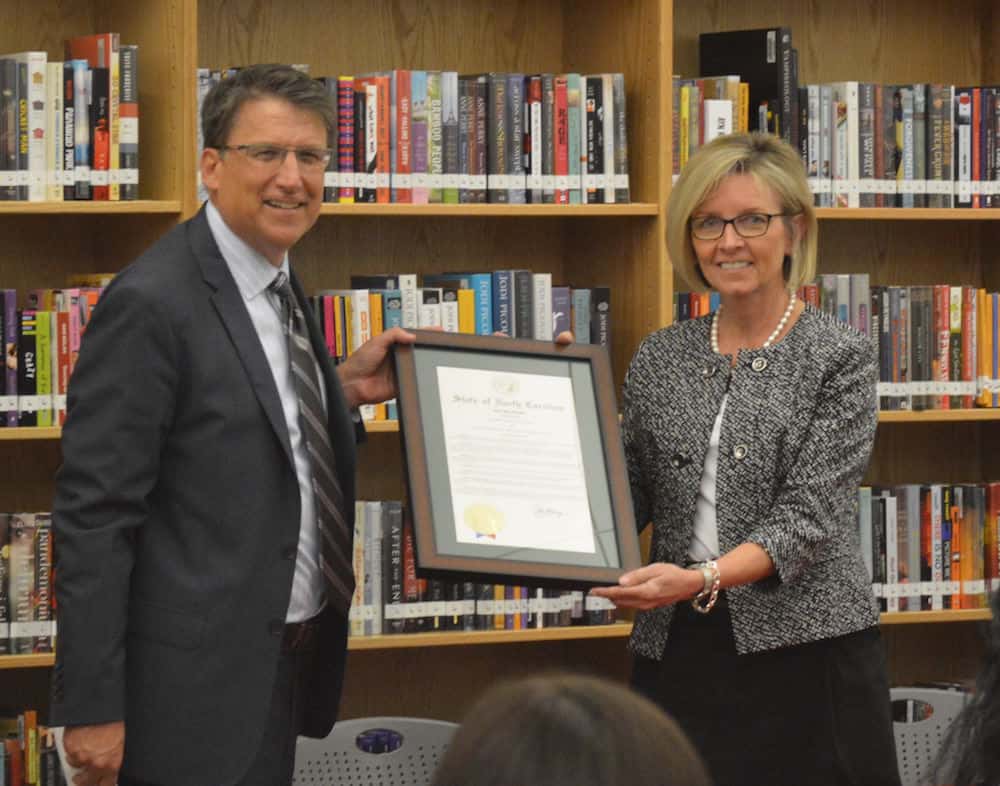
The Kenan Fellows Program recently released the inaugural edition of their first scholarly journal, the Journal of Interdisciplinary Teacher Leadership (JoITL). Over the next two days, Education NC will feature excerpts from the journal: Today, an introduction from Dr. Elaine Franklin, director of the Kenan Fellows Program for Teacher Leadership; and tomorrow, “Walking the Walk: An Integrated STEM Project for Elementary Teachers.”
The Journal of Interdisciplinary Teacher Leadership (JoITL) is a peer-reviewed publication of the Kenan Fellows Program for Teacher Leadership featuring original work on educational topics from research to pedagogy to policy and beyond. It is grounded in the belief that education benefits from diversity of thought and the crossing of disciplinary boundaries. With this in mind, JoITL is designed to engage the scholarship of a wide cross-section of education professionals and provide a space for sharing both research and practice. Educators who seek an intellectual community with whom to share work, explore ideas, and advance teaching and learning are encouraged to become part of the JoITL community.
JoITL was founded in response to a group of Teacher Leaders (Kenan Fellowship awardees) who were seeking a new venue for publishing academic work. They envisioned a journal that would hold to high standards, reflect multiple perspectives, and appeal to the kind of educators who choose to lead the profession from the classroom rather than from administrative positions. They also wanted a journal that would be open to multiple types of articles including, but not limited to, literature reviews, research articles, well-constructed essays, and book reviews.
The five articles in this inaugural edition well reflect the vision of diversity and inclusion in which JoITL is grounded. Among the authors are seasoned K-12 teachers, doctoral candidates, and professors from colleges of education, textiles, and engineering. Although no theme was identified in the call for submissions, several arise from the five articles. The most prominent being one of education’s classic dichotomies — the tension between experience and reflection. In the first article, Brian Cartiff argues for more explicit instruction regarding the nature of science (NOS). He notes that inquiry lessons alone are not sufficient to convey the characteristics of scientific knowledge or scientific ways of knowing. He posits that an understanding of the nature of science is better developed when inquiry lessons are coupled with guided reflection. Cartiff asserts that a broader, reflective view of scientific work across time, in the form of the history and philosophy of science, would help learners see science as a creative, collaborative endeavor and reveal the dynamic nature of scientific knowledge.
In their article, Rebecca Hite, Gail Jones, and Jesse Jur demonstrate the significance of research experiences for teachers. They make the observation that teachers who have not had the opportunity to experience the processes of scientific investigation or engineering design are more likely to believe that science is a passive, codified body of facts. Sarah Carrier, Valerie Faulkner, and Laura Bottomley’s article focuses on the experiences of undergraduate pre-service teachers (PST) as they develop and implement integrated STEM investigations for grades K-2. The PSTs in their study saw a high level of engagement among their young students, but they did not feel that the students made connections between what they were doing and why they were doing it. As observed by the authors, the PSTs were learning the challenge of balancing engagement with conceptual understanding.
While experience and reflection (thought) may not have been the primary focus for these authors, their work well illustrates how important both are to learning. The inadequacy of either experience or thought alone to result in learning has long been acknowledged, but the reality of that understanding is continually made fresh in the act of educating others. As noted by John Dewey in Democracy and Education (1916), learning is about seeing connections and understanding relationships, and relationships cannot be established when experience and thought are disconnected. He believed that understanding born out of thought alone was an impoverished kind of knowing, and that activity separated from thought served to make an act mechanical.
The final two articles in this edition, by Katherine Baker and Cynthia Bullard, are abbreviated literature reviews that explore alternative pedagogies for engaging students and causing them to become both constructors and generators of knowledge. Baker’s thoughts on culturally relevant mathematics pedagogy and Bullard’s on gamification and game-based instruction emphasize the agency of the learner and stress the need for authentic experiences in which students can find relevance and meaning.
It is exciting to see the vision that grew from a small group of Teacher Leaders come into fruition in the form of this first edition of the Journal of Interdisciplinary Teacher Leadership. Our goal is to publish twice yearly (January and July) and provide a space for ideas and discourse from an ever-growing interdisciplinary community of educators.
